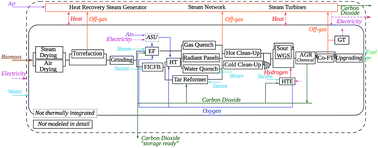Thermo-economic analysis and multi-objective optimisation of lignocellulosic biomass conversion to Fischer–Tropsch fuels†
Abstract
This paper addresses the techno-economic evaluation and optimisation of processes converting lignocellulosic biomass into liquid fuels, through the development of a suitable framework and the modelling and design of Biomass to Liquids (BTL) processes. In particular, the focus is on the production of drop-in fuels through gasification and Fischer–Tropsch (FT) synthesis. Several conversion technologies are presented and evaluated in the literature, but the comparison of different options is hazardous because of the different assumptions and methodologies adopted in each study. A systematic and consistent approach is therefore developed to explore the trade-offs of alternative process configurations and of the operating conditions. The comparison presented in this study explores the trade-offs of different technological options in terms of competing economic and thermodynamic objectives. Results show that for 200 MWth biomass input plant capacities, production costs are in the range of 1.0–1.4 € l−1 for technologies producing up to about 0.5 kJFT kJth−1 and close to being neutral in terms of electricity balance. For technologies using electrolysis the conversion can increase to 0.8 kJFT kJth−1 with production costs of 1.8 € l−1. The electricity storage capacity, in this case, is of 0.5 kJe kJFT−1, corresponding to a net electricity requirement of about 0.4 kJe kJth−1.



 Please wait while we load your content...
Please wait while we load your content...